Economy
Food Crisis Looms in Northern Nigeria as World Bank Warns of Insecurity and Inflation

The World Bank has issued a warning that seven states in northern Nigeria are facing a high risk of food insecurity in 2024, due to the ongoing insecurity and armed conflicts in the region.
The states affected are Borno, Adamawa, Yobe, Kaduna, Katsina, Sokoto, and Zamfara, which are located in the northeast and northwest zones of the country.
The World Bank’s latest food security report projected that most areas in West and Central Africa would have minimal or moderate food insecurity (IPC Phase 1 or 2) until May 2024, but Nigeria’s northern states would suffer from crisis or emergency food insecurity levels (IPC Phase 3 or 4), mainly because of the worsening security situation and the decline of livelihoods.
The report also noted that some areas in the northeastern states, such as Abadam, Bama, Guzamala, Marte and others, would experience severe food shortages and limited access to markets and humanitarian assistance, as a result of the insurgency and violence perpetrated by Boko Haram and other armed groups.
The World Bank further stated that over 63.2% of low-income countries witnessed inflation rates above 5%, which was a 1.3%-point increase from the previous food update on January 17, 2023.
Nigeria has been grappling with a food crisis that has driven up the prices of food items in the market, due to the inability of farmers to cultivate their lands in the north, as a result of the rampant banditry and kidnapping that have plagued the region.
Economy
World Bank approves fresh $500m loan for Nigeria

The World Bank has approved a $500 million loan to Nigeria to support the country’s Community Action for Resilience and Economic Stimulus Program.
The loan was granted on March 28, 2025, according to report, marking a significant step in addressing Nigeria’s economic challenges through expanded access to livelihood support, food security services, and grants for poor and vulnerable households and businesses.
The project officially titled the NIGERIA: Community Action (for) Resilience and Economic Stimulus Program, aims to provide essential support to households affected by economic downturns and to bolster community resilience.
It will target vulnerable populations, offering grants to both households and small businesses to mitigate the impact of economic hardships.
The loan approval is expected to significantly enhance Nigeria’s efforts to stimulate the economy through grassroots support, particularly amid ongoing challenges such as inflation and high living costs.
The stimulus package will focus on improving food security and economic opportunities for communities hit hardest by recent economic fluctuations.
Daily Trust reports that in addition to the fresh loan, the World Bank is expected to give approval to other facilities later this week, the development which would significantly increase the country’s debt profile.
Economy
SEE Dollar to Naira Exchange Rate Today, Friday, March 28, 2025

The exchange rate between the U.S. Dollar (USD) and the Nigerian Naira (NGN) remains a crucial topic for businesses, travelers, and investors.
As of today, Friday, March 28, 2025, the exchange rates in both the official and parallel markets have experienced fluctuations, reflecting ongoing economic trends.
Official Dollar to Naira Exchange Rate The Central Bank of Nigeria (CBN) sets the official exchange rate, which is significantly lower than the parallel market rate. According to the latest data: Dollar to Naira exchange rate for today, Friday, March 28, 2025, is approximately ₦1,519 to ₦1,542 in the official market.
Source Exchange Rate (₦ per $1) Date CBN ₦1,532.39 March 25, 2025 Yahoo Finance (Opening) ₦1,531.50 March 27, 2025 Yahoo Finance (Closing) ₦1,533.52 March 27, 2025 The official exchange rate is the rate at which commercial banks and financial institutions trade forex under CBN regulations.
However, due to forex scarcity, many individuals and businesses turn to the black market.
Black Market Dollar to Naira Exchange Rate The parallel market (black market) offers a different exchange rate, often higher than the official rate.
Reports from the Lagos parallel market on March 27, 2025, indicate: In the black market, the Dollar to Naira exchange rate as of today, March 28, 2025, is approximately ₦1,560 for buying and ₦1,570 for selling. –
Transaction Type Exchange Rate (₦ per $1) Buying Rate ₦1,555 Selling Rate ₦1,560 Other reports suggest an average black market rate of ₦1,540 per USD, reflecting the fluctuations observed throughout the week.
Recent Dollar to Naira Fluctuations Over the past week, the exchange rate has varied significantly: Date Lowest Rate (₦) Highest Rate (₦) March 24, 2025 ₦1,566.29 ₦1,566.29 March 27, 2025 ₦1,514.92 ₦1,533.52 These fluctuations highlight the volatility in the forex market, influenced by factors such as inflation, forex reserves, and government policies.
Government’s Stance on Forex Exchange The CBN does not officially recognize parallel market rates and advises individuals to conduct foreign exchange transactions through authorized financial institutions.
The apex bank has implemented policies to stabilize the naira, including forex interventions and restrictions on certain transactions.
Experts recommend businesses and individuals monitor the forex market closely and use official channels to avoid excessive rates and fraud in the black market. What you Should Know The dollar to naira exchange rate remains a key economic indicator in Nigeria.
With ongoing market fluctuations, staying informed about both official and parallel market rates is crucial for businesses and individuals making financial decisions. For real-time updates on exchange rates, consult financial institutions, forex trading platforms, or the Central Bank of Nigeria.
Economy
Cardoso: CBN FX Reforms Yielding Positive Results

The Governor of the Central Bank of Nigeria (CBN), Olayemi Cardoso, has said the bank is beginning to see signs of progress in stabilising the foreign exchange (FX) market and curbing inflation, as recent policy reforms start to yield results.
Cardoso stated this during an engagement with scholars from the Harvard Kennedy School (HKS) at the CBN headquarters in Abuja.
The scholars were visiting Nigeria as part of the Africa Trek initiative, which also included a stop in Ghana.
The visit marked the first time a Harvard Africa Trek delegation would visit the Central Bank of Nigeria.
The delegation was comprised of 50 students from 19 countries, including representatives from Harvard Business School, Massachusetts Institute of Technology (MIT), and Stanford University.
In a statement issued by the CBN on Tuesday, Cardoso, who is an HKS alumnus and the first African elected to the global HKS Alumni Board of Directors, reiterated the Bank’s commitment to driving policy-oriented solutions and strengthening trust in Nigeria’s financial system.
“As we reset the Bank, we are committed to being a hub for thought leadership. The exposure you gain from institutions like Harvard is invaluable, and we see this as an opportunity to build long-term alliances,” Cardoso said.
While addressing Nigeria’s macroeconomic outlook, he acknowledged existing challenges but pointed to key indicators suggesting improvement.
He noted that the FX market is beginning to stabilise and that inflationary pressures are gradually moderating.
The statement read, “Addressing Nigeria’s economic landscape, Mr Cardoso acknowledged recent challenges but highlighted progress in stabilizing the foreign exchange market and curbing inflation.”
Cardoso also highlighted the growing interest from international institutions as a positive signal. He referenced recent visits from senior executives at JP Morgan, Citi Bank, and the International Monetary Fund (IMF) as evidence of renewed investor confidence.
“These are individuals who base their decisions on data and trends, not sentiment. Their interest reaffirms that we are on the right path,” he added.
President of the Harvard Kennedy School Alumni Association of Nigeria, Adaora Ndukwe, and the HKS Nigeria Trek Delegation Lead, Sheffy Kolade, commended the CBN for hosting the students and for its continued engagement with future policymakers.
The Africa Trek is designed to facilitate direct interaction between emerging global leaders and key African policymakers.
It serves as a platform for discussions on governance, innovation, economic development, and the strategic role of central banks in national growth.
-
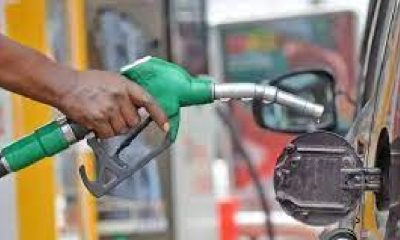
 News20 hours ago
News20 hours agoPetrol prices rise nationwide as MRS, other atations hike rates
-

 News20 hours ago
News20 hours agoPAINFUL! Nigerian Boxing Sensation Olanrewaju Dies in Ghana After Slumping During Fight
-
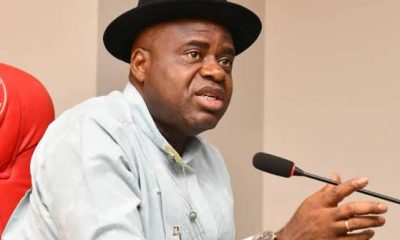
 News14 hours ago
News14 hours agoWATCH Gov Diri’s Tech Adviser, Kerry admits blowing up pipelines
-
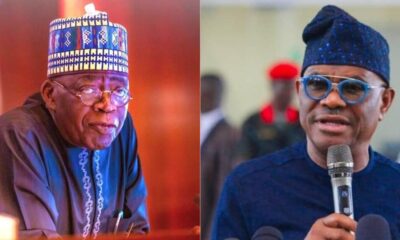
 News17 hours ago
News17 hours ago“How I threatened to fire Wike over TSA exemption but I’m happy with him”-Tinubu
-
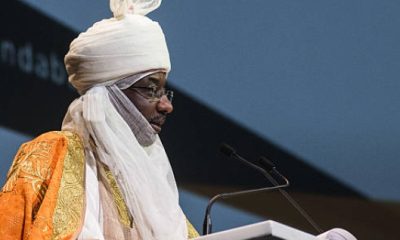
 News20 hours ago
News20 hours agoEdo killings: Sanusi warns Kano youths against vengeful attack
-
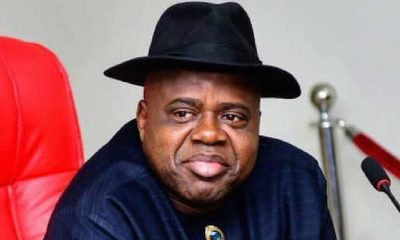
 News6 hours ago
News6 hours agoUpdated: WATCH moment Gov Diri’s Tech Adviser Kerry admits blowing up pipelines (Video)
-
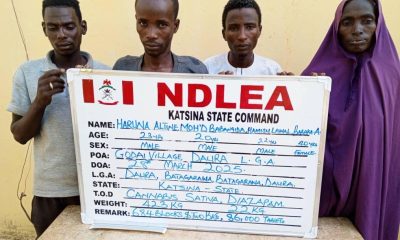
 News24 hours ago
News24 hours agoLekki, Italy based businessmen nabbed over illicit drug shipments to Nigeria, Europe(PHOTOS)
-

 Entertainment16 hours ago
Entertainment16 hours agoEdo Assembly member, Natasha Updates Social Media with Fiancé’s Surname, Idibia





